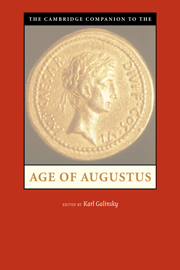Book contents
- Frontmatter
- Introduction
- Part I Political History
- Part II Intellectual and Social Developments
- Part III The Emperor's Impact
- Part IV Art and the City
- Part V Augustan Literature
- 12 Learned Eyes: Poets, Viewers, Image Makers
- 13 Augustan Poetry and Augustanism
- 14 Poets in the New Milieu: Realigning
- 15 Vergil’s Aeneid and Ovid’s Metamorphoses as World Literature
- Part VI Epilogue as Prologue
- Select Bibliography and Works Cited
- Index
14 - Poets in the New Milieu: Realigning
from Part V - Augustan Literature
Published online by Cambridge University Press: 28 March 2007
- Frontmatter
- Introduction
- Part I Political History
- Part II Intellectual and Social Developments
- Part III The Emperor's Impact
- Part IV Art and the City
- Part V Augustan Literature
- 12 Learned Eyes: Poets, Viewers, Image Makers
- 13 Augustan Poetry and Augustanism
- 14 Poets in the New Milieu: Realigning
- 15 Vergil’s Aeneid and Ovid’s Metamorphoses as World Literature
- Part VI Epilogue as Prologue
- Select Bibliography and Works Cited
- Index
Summary
The two decades of civil war preceding the Augustan Principate did not extinguish poetic activity in the capital. Libretti continued to be produced for scenic festivals each year and verse in other genres was being written in the 40s (notably by Cornelius Gallus, Varius, and Vergil) and in the 30s (when Horace made his debut). But the wars took a toll. The poets Helvius Cinna, Cornificius, Cassius Parmensis, and Ticida met violent deaths, to say nothing of victims like the Ciceros for whom poetry was an avocation. Gallus succumbed to politics in the peace immediately afterwards. Wholesale proscriptions and confiscations caused a transfer of wealth that touched many who did not lose their lives, apparently including Vergil, Horace, Tibullus, and Propertius. And it was not only the effects on poets that depressed literary culture. The wars bled the whole upper class that had consumed and fostered poetry. Twenty years would have sufficed to transform literary society in any case, but there can be no doubt that the wars accelerated the turnover. Of the many personalities celebrated in Catullus' poems, the only one still active when peace returned was Asinius Pollio.
- Type
- Chapter
- Information
- The Cambridge Companion to the Age of Augustus , pp. 321 - 339Publisher: Cambridge University PressPrint publication year: 2005
- 6
- Cited by

